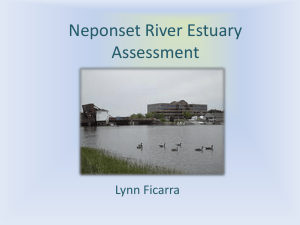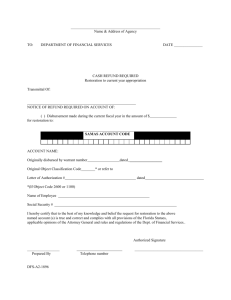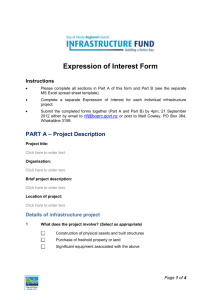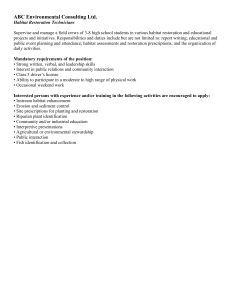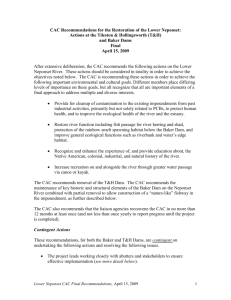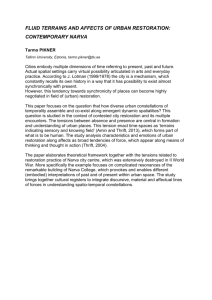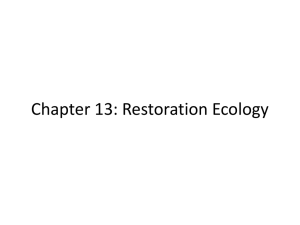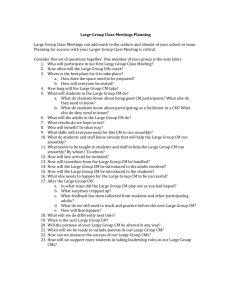Lower Neponset River Restoration
advertisement
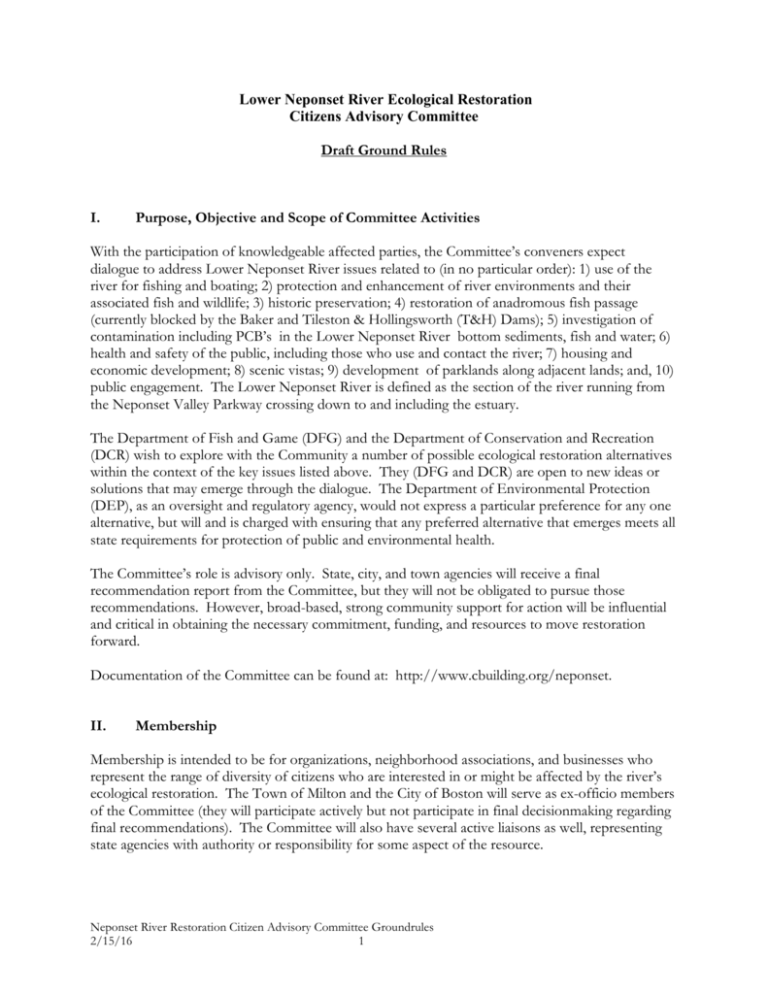
Lower Neponset River Ecological Restoration Citizens Advisory Committee Draft Ground Rules I. Purpose, Objective and Scope of Committee Activities With the participation of knowledgeable affected parties, the Committee’s conveners expect dialogue to address Lower Neponset River issues related to (in no particular order): 1) use of the river for fishing and boating; 2) protection and enhancement of river environments and their associated fish and wildlife; 3) historic preservation; 4) restoration of anadromous fish passage (currently blocked by the Baker and Tileston & Hollingsworth (T&H) Dams); 5) investigation of contamination including PCB’s in the Lower Neponset River bottom sediments, fish and water; 6) health and safety of the public, including those who use and contact the river; 7) housing and economic development; 8) scenic vistas; 9) development of parklands along adjacent lands; and, 10) public engagement. The Lower Neponset River is defined as the section of the river running from the Neponset Valley Parkway crossing down to and including the estuary. The Department of Fish and Game (DFG) and the Department of Conservation and Recreation (DCR) wish to explore with the Community a number of possible ecological restoration alternatives within the context of the key issues listed above. They (DFG and DCR) are open to new ideas or solutions that may emerge through the dialogue. The Department of Environmental Protection (DEP), as an oversight and regulatory agency, would not express a particular preference for any one alternative, but will and is charged with ensuring that any preferred alternative that emerges meets all state requirements for protection of public and environmental health. The Committee’s role is advisory only. State, city, and town agencies will receive a final recommendation report from the Committee, but they will not be obligated to pursue those recommendations. However, broad-based, strong community support for action will be influential and critical in obtaining the necessary commitment, funding, and resources to move restoration forward. Documentation of the Committee can be found at: http://www.cbuilding.org/neponset. II. Membership Membership is intended to be for organizations, neighborhood associations, and businesses who represent the range of diversity of citizens who are interested in or might be affected by the river’s ecological restoration. The Town of Milton and the City of Boston will serve as ex-officio members of the Committee (they will participate actively but not participate in final decisionmaking regarding final recommendations). The Committee will also have several active liaisons as well, representing state agencies with authority or responsibility for some aspect of the resource. Neponset River Restoration Citizen Advisory Committee Groundrules 2/15/16 1 III. Participation A. The Committee consists of individuals representing interests, organizations or stakeholder groups. Committee members are responsible for expressing the views of their constituency rather than their personal views. B. Each organization or stakeholder group shall be represented by a principal and may also be represented, in the absence of the principal, by an alternate. As used in these groundrules, the term “members” includes principals and alternates. C. Principals and alternates should be authorized by their organization to speak on behalf of that organization to the greatest extent possible. D. Principals are expected to attend all meetings and notify the facilitator and their alternate if they cannot attend. Alternates are expected to stay abreast of all Committee proceedings, preferably attending most or all meetings, in order to be able to step in to the principal’s role effectively as needed. IV. Decision Making A. The Committee will operate by consensus. Consensus is defined as all members (principal, or his or her alternate) of the Committee agreeing to a final package proposal that seeks to meet diverse interests. Consent means that members can at least “accept”, however reluctantly, the package agreement that emerges. Abstaining members are not counted in the tally for determining consensus. B. Members may choose to “abstain” or “step aside” in order to not block progress, but also to not endorse a particular agreement. C. Members should not block or withhold consensus unless they have serious reservations with the approach or solution that is proposed for consensus. D. If members disagree with the approach or solution proposed, they should make every effort to offer an alternative for consideration that will be satisfactory to all members. E. A member’s absence (principal or alternate) from a meeting in which consensus will be deliberated or decided will be equivalent to abstaining. F. Final decision making is expected around a “package proposal” that incorporates a number of features to meet the diverse interests and achieve a number of objectives to be detailed by the CAC. G. All major decisions will be noted in agendas prior to CAC meetings so members are well aware of key decision-making meetings. H. If the Committee does not reach consensus on one or more recommendations, Committee members will explore the reasons for disagreement. The Committee will identify areas in Neponset River Restoration Citizen Advisory Committee Groundrules 2/15/16 2 which the committee reached agreement, where disagreement remained, the reasons behind that disagreement, a description of the interests that must be satisfied to reach an agreement, and if possible, ways to address the differences in the future. V. Committee Meetings A. All meetings of the full Committee will be announced prior to the meeting and will be open to the public. B. The deliberations are meant primarily for the members of the Committee, with the public invited and encouraged to observe. A period in the agenda for public comment will be provided at the end of each meeting for public comments, as needed. C. Brief summaries of Committee meetings will be prepared by the facilitators and, after review and approval by the Committee, then will be made available to the public on the Committee’s website (see web address under Section I). The summaries are not intended to be transcripts or detailed meeting minutes, but summaries of key points, issues, and ideas. D. The Coordinating Committee (described below) will responsible for developing agendas for all meetings of the Committee. Draft agendas will be made available ahead of time to the CAC and will be considered draft until approved at the beginning of each CAC meeting. E. Committee members and alternates will have their names and organizations posted on the project website. Emails or phone numbers will be made available to members and alternates only, for use for Committee business only. VI. Committee and Agency Coordination A. The Committee will be assisted by a Coordinating Group consisting of the City of Boston Office of Environmental and Energy Services, Town of Milton Conservation Commission, State agencies (DCR, DFG, DEP), and two organizations with a long-standing focus on restoration and community revitalization in the area (Neponset River Watershed Association and Lower Mills Merchants Association). The CAC may add representation to this group, if they deem it necessary. B. This Coordinating Group will help plan for and develop agendas, oversee the work of the facilitator, provide administrative and financial support, and other tasks as needed to ensure an effective, well-functioning process. The Coordinating Group may choose to have meetings in-person or via conference phone. The Group may also choose to solicit agency/government leadership participation at key points. C. Importantly, this Group will also help coordinate interests and resources among the state and city/town agencies, provide presenters and technical expertise, provide for and ensure effective public communications, conduct additional technical work needed, to the extent resources allow, and work to ensure a close and effective integration of CAC and agency work and deliberation. Neponset River Restoration Citizen Advisory Committee Groundrules 2/15/16 3 VII. Citizen Roles and Responsibilities A. All members on the Committee agree to the following: Keep their constituencies informed about the Committee’s deliberations and to actively seek their inputs; Represent the interests and concerns of their organizations, and constituents as accurately and thoroughly as possible, and work to ensure that any recommendation developed by the Committee is acceptable to their organizations; Strive throughout the process to bridge gaps in understanding, to seek resolution of differences, and to pursue the goal of achieving consensus on the content under discussion; Make a good faith effort to participate in all scheduled meetings or activities. B. In order to facilitate an open and collaborative discussion, the participants agree to abide by the following rules: Only one person will speak at a time and no one will interrupt when another person is speaking; Each person will express his or her own views, his or her organization’s and constituent views, rather than speaking for other Committee participants or on behalf of the Committee as a whole; Each person will refrain from making personal attacks, calling names, and other such negative behavior; Each person will make every effort to stay on track with the agenda and avoid grandstanding and digressions in order to move the conversation forward. XIII. Coordinating Group Roles and Responsibilities A. Coordinating Group representatives will attend all meetings of the CAC and in-between meetings/calls of the Coordinating Group. B. Coordinating Group representatives will abide by the “good citizen” rules noted above in Section VIII. C. Coordinating Group representatives will contribute funding and/or in-kind resources to support the work of the CAC. Such resources may include, but not be limited to: a. Presenters’ time and effort. b. Technical resources, including contracted resources when dollars allow. c. Administrative assistance such as mailing, copying, meeting space arrangements, providing food for meetings, and so forth. d. Communications materials, such as fact sheets, news releases, and so forth. Neponset River Restoration Citizen Advisory Committee Groundrules 2/15/16 4 IX. Facilitator Roles and Responsibilities A. The facilitators will serve at the discretion of the full Committee. The facilitators will be responsible for helping to ensure that the process runs smoothly, developing meeting agendas, preparing and distributing draft and final summaries, generating draft agreements, and helping the parties resolve their differences and achieve consensus on the issues to be addressed by the Committee. B. The facilitators will be available to consult confidentially with Committee participants during or between meetings. Facilitators, if asked, are required to hold confidences even if that means withholding information that the facilitators prefer would be made available to the whole group. C. The facilitators have no decision-making authority and cannot impose any solution, settlement, or agreement among any or all of the parties. D. The facilitators will abide by the Ethical Standards of the Association of Conflict Resolution. In part, these standards require that: “The neutral must maintain impartiality toward all parties. Impartiality means freedom from favoritism or bias either by word or by action and a commitment to serve all parties as opposed to a single party.” X. Media and Public Communications A. Individuals are free to speak to the media (print, web, radio, T.V.) and in their own communications about the process in general and their particular interests, concerns, and ideas. However, Committee members agree not to represent or characterize the views of others in the media or any public communications (newsletters, websites, etc.). Members also agree not t o speak on behalf of the Committee as a whole. In short, people are free to speak for themselves, but agree not to speak for others or on behalf of the Committee. B. The Committee may select a press spokesperson, if they wish, to communicate agreed-upon messages or views of the Committee as a whole. Neponset River Restoration Citizen Advisory Committee Groundrules 2/15/16 5
